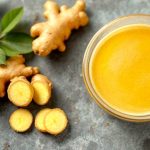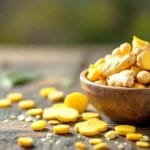Your cart is currently empty!
Takeaways
- Ginger contains compounds that reduce inflammation and allergy symptoms
- Regular consumption of ginger may help manage seasonal allergies
- Ginger supports immune function and can complement conventional treatments
- Various forms of ginger offer flexible options for allergy relief
- Proper dosage and preparation maximize ginger’s benefits for allergies
- Ginger is generally safe but may have mild side effects for some people
Nature’s Antihistamine: Ginger Unveiled
Ginger is a well-known natural option for managing allergy symptoms. This root has been used medicinally for many centuries. Its ability to help reduce allergy symptoms is now widely acknowledged.
Ancient medical practices often used ginger for its healing properties. Traditional healers used it to treat a variety of conditions. Modern research is now validating many of these historical applications.
Ginger is becoming increasingly popular as a way to manage allergies. People are often looking for natural remedies instead of traditional medicines. Ginger provides a helpful option for those dealing with allergies.
The Science Behind Ginger’s Allergy-Fighting Power
Bioactive Compounds
Ginger contains several active compounds. These compounds are responsible for its beneficial effects. Understanding these compounds helps us see why ginger is helpful for allergies.
| Compound | Effect on Allergy Symptoms |
|---|---|
| Gingerols | Reduce inflammation |
| Shogaols | Inhibit allergic reactions |
| Zingerone | Suppresses immune overreaction |
| Paradols | Decrease histamine release |
The compounds in ginger work together to help with allergies. Their combined effects make ginger a useful natural antihistamine.
Inflammation Reduction
Ginger’s ability to reduce inflammation is key to relieving allergy symptoms. Inflammation is often the cause of discomfort with allergies. Ginger helps to lessen these symptoms by reducing inflammation.
Ginger works to reduce inflammation in the body. It helps to stop the creation of substances that cause inflammation. This action helps to decrease swelling and irritation linked to allergies.
- Inhibits pro-inflammatory enzymes
- Reduces cytokine production
- Decreases histamine release
- Lowers prostaglandin levels
Immune System Support
Ginger affects the immune system in different ways. A balanced immune system is helpful in managing allergies. Ginger helps achieve this balance, potentially lessening allergy symptoms.
Ginger can adjust how the immune system works. It can strengthen some immune responses while weakening others. This helps the body react correctly to allergens.
- Stimulates production of immune cells
- Enhances antioxidant defenses
- Regulates inflammatory responses
- Supports healthy gut microbiome
- Improves circulation of immune cells
Ginger vs. Common Allergens
Ginger has shown promise in helping with different types of allergies. Its compounds target the root causes of symptoms from various allergens. This understanding helps us use ginger effectively for specific allergies.
| Allergen | Ginger’s Effectiveness |
|---|---|
| Pollen | High |
| Dust mites | Moderate |
| Pet dander | Moderate |
| Food allergens | Variable |
| Mold spores | Moderate |
Ginger’s compounds can reduce various allergy symptoms. They can help with sneezing, stuffiness, and itching. Some find relief from skin reactions as well.
Forms and Preparations of Ginger
Fresh Ginger Root
Fresh ginger root is very effective for allergy relief. It contains the highest amount of useful compounds. Using fresh ginger provides many options for how to prepare it.
Choose ginger roots that are firm and smooth. Store them in a cool, dry place. Peel ginger just before using it to keep it fresh.
- Grate into hot water for tea
- Add to smoothies or juices
- Use in cooking for savory dishes
- Chew small pieces for quick relief
Ginger Tea
Ginger tea can help soothe allergy symptoms effectively. The warmth helps to clear congestion. It also delivers ginger’s helpful compounds directly to the irritated tissues.
To prepare ginger tea, slice fresh ginger and place it in hot water. If you wish, add honey or lemon for taste. Drink two to three cups each day for the best results.
- Slice 1-inch piece of fresh ginger
- Add to a mug of hot water
- Steep for 5-10 minutes
- Strain and enjoy
- Repeat 2-3 times daily
Ginger Supplements
Ginger supplements are a convenient way to manage allergy symptoms. They are available in capsule or tablet form. Supplements ensure a consistent amount of ginger’s active compounds.
When choosing supplements, consider their strength and quality. Look for products that state the specific amount of active compounds they contain. Always follow the dosage recommendations.
- Choose reputable brands
- Check for third-party testing
- Consider ginger extract potency
- Look for organic options
- Consult a healthcare provider before use
Incorporating Ginger into Your Allergy Management Plan
Ginger works best when used with other natural health practices. Combining ginger with other natural remedies improves results. Healthy lifestyle choices can also help ginger work better.
Ginger works well with other natural allergy remedies. Pair it with local honey or foods rich in quercetin. These combinations may offer better allergy relief.
- Consume ginger regularly during allergy season
- Use ginger in cooking to increase daily intake
- Try ginger tea before bed to ease nighttime symptoms
- Combine with nasal irrigation for sinus relief
- Use ginger essential oil in a diffuser
Potential Side Effects and Precautions
While generally safe, ginger can cause side effects for some people. Most side effects are mild and short-lived. Understanding these possible risks helps ensure ginger is used safely.
Certain people should use ginger with care. Pregnant women and people with bleeding issues should be especially cautious. Always talk to a doctor before using ginger for medicinal purposes.
- Mild heartburn or stomach upset
- Increased bleeding risk in high doses
- Possible interaction with blood thinners
- Skin irritation from topical use
- Allergic reactions (rare)
Ginger and Conventional Allergy Treatments
Ginger can be used alongside traditional allergy medicines. Its natural compounds might improve the effectiveness of some medications. However, it is important to be cautious of potential interactions.
Some allergy medicines may not mix well with ginger. Blood thinners and some heart medicines require extra care. Always tell your doctor if you are using ginger.
- Does ginger interact with my current medications?
- Can I reduce my antihistamine dose when using ginger?
- How should I time ginger consumption with my allergy meds?
- Are there any allergy drugs I should avoid while using ginger?
- Can ginger replace any of my current allergy treatments?
Ginger-Based Recipes for Allergy Relief
Adding ginger to your meals can be enjoyable and helpful. These recipes are a delicious way to consume ginger for allergy relief. They combine ginger with other foods that are good for allergies.
These recipes help to alleviate common allergy symptoms. They may reduce inflammation and improve immune system function. Try them during allergy season for natural symptom relief.
- Ginger and Turmeric Smoothie
- Lemon-Ginger Detox Water
- Ginger-Garlic Chicken Soup
- Spicy Ginger Carrot Juice
- Ginger-Honey Throat Soother
Myths and Facts About Ginger and Allergies
There are many incorrect ideas about ginger and allergies. It is important to know the facts in order to make informed decisions. Research supports some claims while proving others wrong.
Research is still being done to learn more about ginger’s effects on allergies. Some traditional uses lack strong scientific support. However, many studies confirm ginger’s anti-inflammatory properties.
- Myth: Ginger cures all allergies instantly
- Fact: Ginger can help manage symptoms but isn’t a cure
- Myth: Ginger is safe for everyone in any amount
- Fact: Some people may experience side effects or interactions
- Myth: Only fresh ginger helps with allergies
- Fact: Various forms of ginger can offer benefits
FAQ: Ginger and Allergy Management
Can ginger cure allergies completely?
How long does it take for ginger to work on allergies?
Is ginger safe for children with allergies?
Can ginger interact with my allergy medications?
How much ginger should I consume for allergy relief?
Are there any allergies that ginger can worsen?
Future Research and Promising Developments
Ongoing research explores how ginger can help treat allergies. Scientists are studying how it works against allergies. New ways to use ginger for allergy management could be discovered.
Future studies may uncover more advantages of ginger for allergies. Scientists are studying its effects on particular allergy types. They are also researching the best amounts and ways to prepare ginger.
- Ginger’s impact on gut health and allergies
- Synergistic effects with other natural compounds
- Long-term benefits of ginger consumption
- Ginger’s role in preventing allergy development
- Novel ginger extracts for targeted allergy relief
Conclusion: Embracing Ginger for Allergy Relief
Ginger is a natural way to help with allergy symptoms. Its ability to reduce inflammation and improve the immune system can provide relief for many. Ginger is available in different forms, making it easy to use in allergy management plans.
Consider using ginger as a part of your strategy for allergy relief. Begin with small amounts and see how your body reacts. Natural remedies work best as part of a complete approach to health.
- Incorporate ginger into your daily routine
- Experiment with different forms of ginger
- Combine ginger with other healthy habits
- Monitor your symptoms and adjust use as needed
- Consult healthcare providers for personalized advice
Ginger’s potential in helping with allergies continues to be researched. As studies continue, we may learn even more benefits. Right now, many find relief and support through this traditional remedy. Whether drinking ginger tea or taking supplements, ginger offers a natural approach to easier breathing and fewer allergy symptoms.
1 Mashhadi, N. S., Ghiasvand, R., Askari, G., Hariri, M., Darvishi, L., & Mofid, M. R. (2013). Anti-oxidative and anti-inflammatory effects of ginger in health and physical activity: review of current evidence. International journal of preventive medicine, 4(Suppl 1), S36–S42. https://www.ncbi.nlm.nih.gov/pmc/articles/PMC3665023/
2 Kawamoto, Y., Ueno, Y., Nakahashi, E., Obayashi, M., Sugihara, K., Qiao, S., Iida, M., Kumasaka, M. Y., Yajima, I., Goto, Y., Ohgami, N., Kato, M., & Takeda, K. (2016). Prevention of allergic rhinitis by ginger and the molecular basis of immunosuppression by 6-gingerol through T cell inactivation. The Journal of nutritional biochemistry, 27, 112–122. https://doi.org/10.1016/j.jnutbio.2015.08.025
3 Nafiseh, S. M., Reza, G., Gholamreza, A., Maryam, H., Leila, D., & Mohammad, R. M. (2013). Anti-Oxidative and Anti-Inflammatory Effects of Ginger in Health and Physical Activity: Review of Current Evidence. International Journal of Preventive Medicine, 4(Suppl 1), S36-S42. https://www.ncbi.nlm.nih.gov/pmc/articles/PMC3665023/
4 Mahluji, S., Ostadrahimi, A., Mobasseri, M., Ebrahimzade Attari, V., & Payahoo, L. (2013). Anti-inflammatory effects of zingiber officinale in type 2 diabetic patients. Advanced pharmaceutical bulletin, 3(2), 273–276. https://doi.org/10.5681/apb.2013.044
5 Wang, S., Zhang, C., Yang, G., & Yang, Y. (2014). Biological properties of 6-gingerol: a brief review. Natural product communications, 9(7), 1027–1030. https://pubmed.ncbi.nlm.nih.gov/25230520/
6 Townsend, E. A., Siviski, M. E., Zhang, Y., Xu, C., Hoonjan, B., & Emala, C. W. (2013). Effects of ginger and its constituents on airway smooth muscle relaxation and calcium regulation. American journal of respiratory cell and molecular biology, 48(2), 157–163. https://doi.org/10.1165/rcmb.2012-0231OC
7 Aryaeian, N., & Tavakkoli, H. (2015). Ginger and its effects on inflammatory diseases. Advanced Food Technology and Nutritional Sciences, 1(4), 97-101. https://openventio.org/wp-content/uploads/Ginger-and-its-Effects-on-Inflammatory-Diseases-AFTNSOJ-1-118.pdf
8 Nikkhah Bodagh, M., Maleki, I., & Hekmatdoost, A. (2019). Ginger in gastrointestinal disorders: A systematic review of clinical trials. Food science & nutrition, 7(1), 96–108. https://doi.org/10.1002/fsn3.807
9 Srinivasan K. (2017). Ginger rhizomes (Zingiber officinale): A spice with multiple health beneficial potentials. PharmaNutrition, 5(1), 18-28. https://doi.org/10.1016/j.phanu.2017.01.001
10 Rahmani, A. H., Shabrmi, F. M., & Aly, S. M. (2014). Active ingredients of ginger as potential candidates in the prevention and treatment of diseases via modulation of biological activities. International journal of physiology, pathophysiology and pharmacology, 6(2), 125–136. https://www.ncbi.nlm.nih.gov/pmc/articles/PMC4103979/
11 Bode, A. M., & Dong, Z. (2011). The Amazing and Mighty Ginger. In I. F. F. Benzie & S. Wachtel-Galor (Eds.), Herbal Medicine: Biomolecular and Clinical Aspects (2nd ed.). CRC Press/Taylor & Francis. https://www.ncbi.nlm.nih.gov/books/NBK92775/
12 Mao, Q. Q., Xu, X. Y., Cao, S. Y., Gan, R. Y., Corke, H., Beta, T., & Li, H. B. (2019). Bioactive Compounds and Bioactivities of Ginger (Zingiber officinale Roscoe). Foods (Basel, Switzerland), 8(6), 185. https://doi.org/10.3390/foods8060185
Last medically reviewed and fact checked on
Colors Nutrition does not provide medical advice, diagnosis, or treatment.




